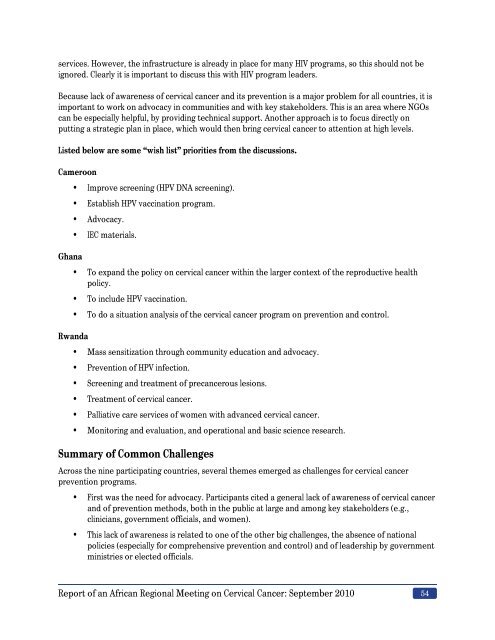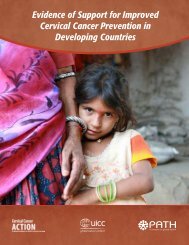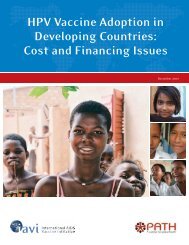Download file, English (1 MB PDF) - RHO
Download file, English (1 MB PDF) - RHO
Download file, English (1 MB PDF) - RHO
You also want an ePaper? Increase the reach of your titles
YUMPU automatically turns print PDFs into web optimized ePapers that Google loves.
services. However, the infrastructure is already in place for many HIV programs, so this should not be<br />
ignored. Clearly it is important to discuss this with HIV program leaders.<br />
Because lack of awareness of cervical cancer and its prevention is a major problem for all countries, it is<br />
important to work on advocacy in communities and with key stakeholders. This is an area where NGOs<br />
can be especially helpful, by providing technical support. Another approach is to focus directly on<br />
putting a strategic plan in place, which would then bring cervical cancer to attention at high levels.<br />
Listed below are some “wish list” priorities from the discussions.<br />
Cameroon<br />
Ghana<br />
• Improve screening (HPV DNA screening).<br />
• Establish HPV vaccination program.<br />
• Advocacy.<br />
• IEC materials.<br />
• To expand the policy on cervical cancer within the larger context of the reproductive health<br />
policy.<br />
• To include HPV vaccination.<br />
• To do a situation analysis of the cervical cancer program on prevention and control.<br />
Rwanda<br />
• Mass sensitization through community education and advocacy.<br />
• Prevention of HPV infection.<br />
• Screening and treatment of precancerous lesions.<br />
• Treatment of cervical cancer.<br />
• Palliative care services of women with advanced cervical cancer.<br />
• Monitoring and evaluation, and operational and basic science research.<br />
Summary of Common Challenges<br />
Across the nine participating countries, several themes emerged as challenges for cervical cancer<br />
prevention programs.<br />
• First was the need for advocacy. Participants cited a general lack of awareness of cervical cancer<br />
and of prevention methods, both in the public at large and among key stakeholders (e.g.,<br />
clinicians, government officials, and women).<br />
• This lack of awareness is related to one of the other big challenges, the absence of national<br />
policies (especially for comprehensive prevention and control) and of leadership by government<br />
ministries or elected officials.<br />
Report of an African Regional Meeting on Cervical Cancer: September 2010 54
















